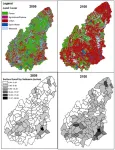(Press-News.org) CHAPEL HILL, NC -- Researchers at the UNC Gillings School of Global Public Health and UNC Lineberger Comprehensive Cancer Center found mailing human papillomavirus (HPV) self-collection tests and offering assistance to book in-clinic screening appointments to under-screened, low-income women improved cervical cancer screening nearly two-fold compared to scheduling assistance alone. Scheduling assistance primarily consisted of helping to book an appointment for in-person screening at a clinic, regardless of whether an at-home test was offered or returned, or whether the HPV test was negative or positive.
The findings from the randomized trial appeared May 11, 2023, in Lancet Public Health.
“My hope going into this study was that mailing kits for home-based collection might increase cervical cancer screening, but we were thrilled to find a nearly two-fold increase in screening uptake,” said UNC Lineberger’s Jennifer S. Smith, PhD, MPH, professor of epidemiology at UNC’s Gillings and corresponding author of this study. “Many hadn’t engaged in the screening system for a while and getting the kit to their homes helped break down a fundamental barrier.”
An estimated 14,000 women will be diagnosed with cervical cancer in the United States this year, according to the National Cancer Institute, and the cancer will lead to more than 4,300 deaths. Cervical cancer disproportionately affects Black and Hispanic women, with Hispanic women having the highest incidence rates, and Black women having the highest mortality rates for the disease in North Carolina and in the United States. Most cervical cancers occur among under-screened women. The Centers for Disease Control and Prevention estimate 22% of eligible adults in the U.S. are overdue for screening.
The My Body, My Test-3 study recruited 665 women, ages 25 to 64, who were uninsured or enrolled in Medicaid or Medicare, from 22 counties across North Carolina. The women had low incomes and most of them lived in urban areas. None had a pap test in four years or a high-risk HPV test in six years, making them overdue for screening.
Two-thirds of the women received mailed HPV self-collection kits followed by assistance with scheduling a screening appointment at a clinic. The other third received screening scheduling assistance alone. The primary outcome was attending an in-clinic screening appointment or testing HPV-negative with self-collected samples within six months of enrollment in the trial.
Screening uptake was 72% among women who received mailed HPV kits compared to 37% for the other group of women. The investigators found that the effect of self-collection outreach on screening uptake didn’t vary across age, race/ethnicity, time since last screening, Medicaid or Medicare insurance coverage, or education.
“Home screening for cervical cancer puts women in control. Most can avoid having to go to a doctor’s appointment. These at-home kits can better reach people without access to screening, who are embarrassed by a cervical exam, or whose religious beliefs include modesty,” said study co-author Noel T. Brewer, PhD, Gillings Distinguished Professor in Public Health and UNC Lineberger member.
“We believe our results are applicable to low-income, under-screened women across the United States,” Smith said. “We’re now working with clinical partners to identify women who might be overdue for screening through electronic medical records. We hope to provide the option of either mailing them a self-collection kit to use at-home to mail back to us or hand a kit directly to them when they come into clinics for other services with the vision to eventually make self-collection a regular clinical provision.”
The UNC researchers also hope their findings, together with previous research findings, will spur the Food and Drug Administration to consider approving HPV self-collection as a primary screening test for cervical cancer in the U.S.
Authors and Disclosures
In addition to Smith and Brewer, the other authors are Peyton K. Pretsch, MPH, Lisa P. Spees, PhD, Michael G. Hudgens, PhD, Busola Sanusi, MA, Eliane Rohner, PhD, Elyse Miller, MPH, Sarah L. Jackson, MPH, and Stephanie B. Wheeler, PhD, MPH, UNC; Lynn Barclay, American Sexual Health Association, Research Triangle Park, NC; and Alicia Carter, MD, Laboratory Corporation of America Holdings, Burlington, NC.
The My Body My Test-3 trial was funded by the R01CA183891 grant from the National Cancer Institute. HPV testing reagents, media for self-collected sample preservation and liquid-based cytology media and cervical sample collection brushes were donated by Hologic, Inc. Self-collection brushes were donated by Rovers Medical Devices.
Smith has received research grants, supply donations and consultancies for Hologic, Inc., BD Diagnostics and Rovers Medical Devices in the past five years. Barclay works for the American Sexual Health Association which receives funding from Hologic. Neither Hologic, BD nor Rovers had input into the research design, analysis or interpretation of results. Wheeler receives grant support from Pfizer for unrelated projects. The other authors declared no conflicts of interest.
END
Cervical cancer screening doubles when under-screened women are mailed testing kits
2023-05-12
ELSE PRESS RELEASES FROM THIS DATE:
THE LANCET PUB. HEALTH: Mailing at-home HPV sampling kits nearly doubles cervical screening uptake among hard-to-reach populations, US clinical trial suggests
2023-05-12
Peer-reviewed / Randomised Controlled Trial / People
Clinical trial with 665 under-screened women in North Carolina (USA) investigated use of high-risk human papillomavirus (hrHPV) self-collection kits to increase cervical cancer screening uptake.
Screening uptake among participants sent self-collection kits and given support to attend an in-person appointment was almost double (72%) the cervical cancer screening uptake in those only given appointment support alone (37%).
More than three quarters (78%) of these underserved participants ...
International Nurses Day: World’s oldest children’s nursing organization recognizes outstanding contributions to the care of children and young people
2023-05-12
At a recent event to celebrate the Association’s 85th Anniversary, the Association of British Paediatric Nurses awarded Honorary Fellowships to eight children’s nurses in recognition of their outstanding contribution to the nursing care of children and young people.
The 2023 Honorary Fellows
Ann Bisbrown Lee for services to children’s nursing and for many years’ service to the Association of British Paediatric Nurses, especially in leading marketing and conference activities.
Professor Steven Campbell for services to children’s nurse education and to the Association ...
Stress-management interventions may help individual healthcare workers for at least a year
2023-05-12
Interventions aimed at reducing work-related stress for individual healthcare workers may lead to improvements in how people cope with stress up to a year later. Findings from a Cochrane review of the latest available evidence build on the conclusions of a previous review in 2015 that found low-quality evidence that interventions, such as cognitive behavioural training (CBT), mental and physical relaxation, were better than none.
The researchers included 117 studies of the effects of different interventions on stress alleviation in the current review, of which 89 studies were new. These 89 studies were published between 2013 and ...
Research pinpoints the time of year and hour when people have the strongest suicidal thoughts
2023-05-12
New research has identified the month when people have the strongest suicidal thoughts, and that these thoughts occur a few months before the peak of suicide behaviours in spring/early summer. It also showed the daily peak in suicidal thought is between 4-5 am.
Most people assume suicide rates will be highest in winter, yet spring/early summer is when suicidal behaviours peak and this finding has baffled researchers since first identified.
Research from the University of Nottingham’s School of Psychology, led in collaboration with the University of Amsterdam and Harvard University, ...
AI study finds that patients with Parkinson’s disease speak differently to healthy patients
2023-05-12
Using artificial intelligence (AI) to process natural language, a research group evaluated the characteristics of speech among patients with Parkinson’s disease (PD). AI analysis of their data determined that these patients spoke using more verbs and fewer nouns and fillers. The study was led by Professor Masahisa Katsuno and Dr. Katsunori Yokoi, Nagoya University Graduate School of Medicine, in collaboration with Aichi Prefectural University and Toyohashi University of Technology. They published their results ...
Astronomers reveal the largest cosmic explosion ever seen
2023-05-12
A team of astronomers led by the University of Southampton have uncovered the largest cosmic explosion ever witnessed.
The explosion is more than ten times brighter than any known supernova (exploding star) and three times brighter than the brightest tidal disruption event, where a star falls into a supermassive black hole.
The explosion, known as AT2021lwx, has currently lasted over three years, compared to most supernovae which are only visibly bright for a few months. It took place nearly 8 billion light years away, when the universe was around 6 billion years old, and is still being detected by a network of telescopes.
The researchers believe that the explosion is ...
Scientists find fire records inside sand dunes
2023-05-12
A previously unrecognised sedimentary archive in sand dunes could unlock a repository of fire records, a discovery that could expand fire histories across the globe.
The research, conducted by Dr Nicholas Patton during his PhD at The University of Queensland, has solved a persistent problem facing historians investigating changing fire patterns.
“Knowing how the frequency and intensity of wildfires has changed over time offers scientists a glimpse into Earth’s past landscapes, as well as an understanding of future climate change impacts,” Dr Patton said.
“To reconstruct fire records, researchers usually rely heavily ...
Brain-belly connection: gut health may influence likelihood of developing Alzheimer’s
2023-05-11
Could changing your diet play a role in slowing or even preventing the development of dementia? We’re one step closer to finding out, thanks to a new UNLV study that bolsters the long-suspected link between gut health and Alzheimer’s disease.
The analysis — led by a team of researchers with the Nevada Institute of Personalized Medicine (NIPM) at UNLV and published this spring in the Nature journal Scientific Reports — examined data from dozens of past studies into the belly-brain connection. The results? There’s a strong link between particular kinds of gut bacteria and Alzheimer’s disease.
Between 500 and 1,000 species of bacteria ...
New research from UMass Amherst links changes in land use to water quality and quantity
2023-05-11
AMHERST, Mass. – Researchers at the University of Massachusetts Amherst recently published a study in the journal PLOS Water that focuses on the Sudbury-Assabet and Concord watershed in eastern Massachusetts, and which links hydrological changes, including floods, drought and runoff, to changing patterns of land use.
“We all live in a watershed” says Timothy Randhir, professor of environmental conservation at UMass Amherst and the paper’s senior author. “We’re constantly modifying our landscape, turning what were once forests into ...
UC Irvine study shows traffic-related air pollution in Irvine weakens brain function
2023-05-11
Irvine, Calif., May 11, 2023 – Researchers from the University of California, Irvine have found that exposure to traffic-related air pollution in Irvine led to memory loss and cognitive decline and triggered neurological pathways associated with the onset of Alzheimer’s disease.
“The link between air pollution and Alzheimer’s disease is concerning, as the prevalence of toxicants in ambient air is not just on the rise globally, but also hitting close to home here in Irvine,” said corresponding ...







